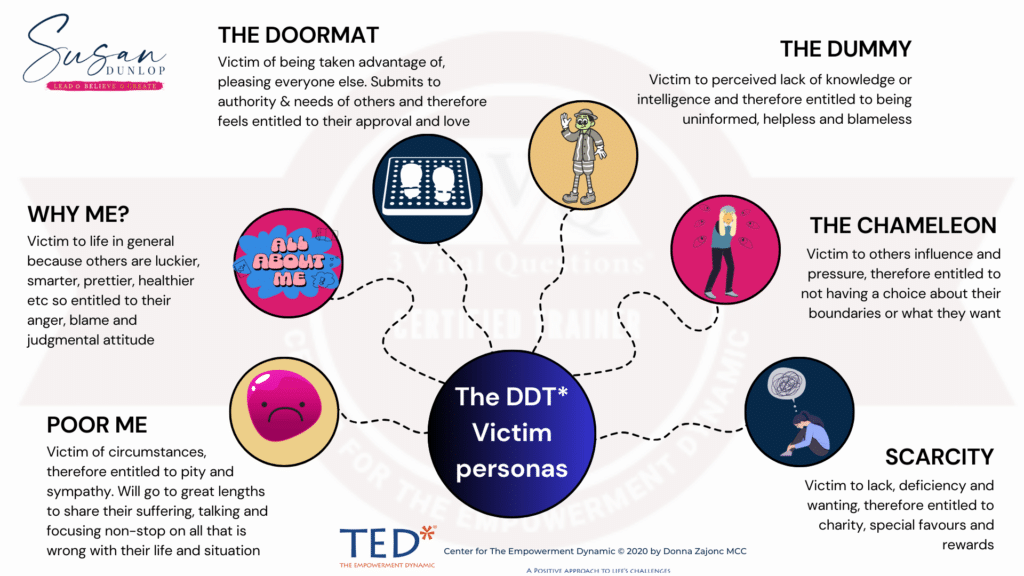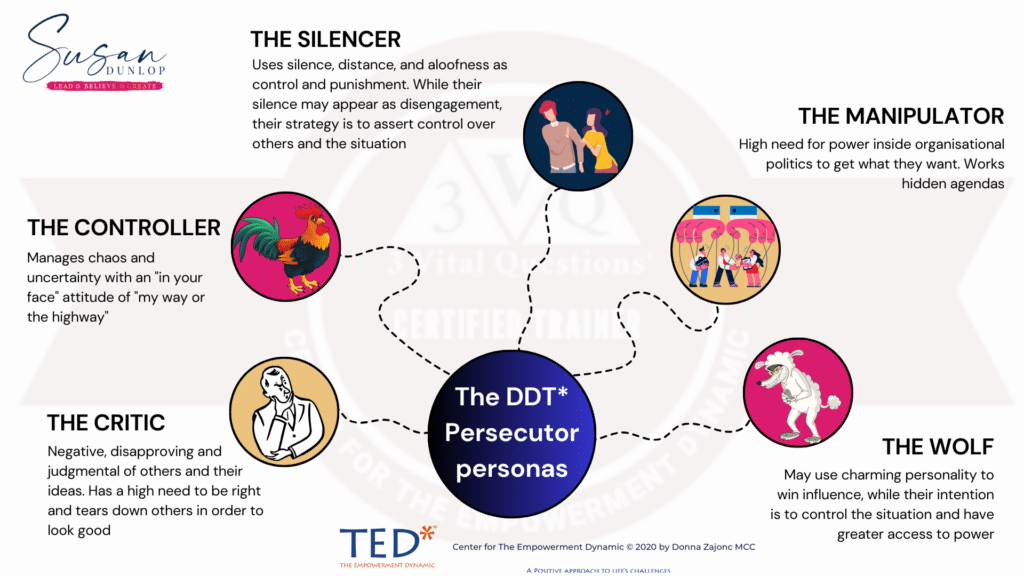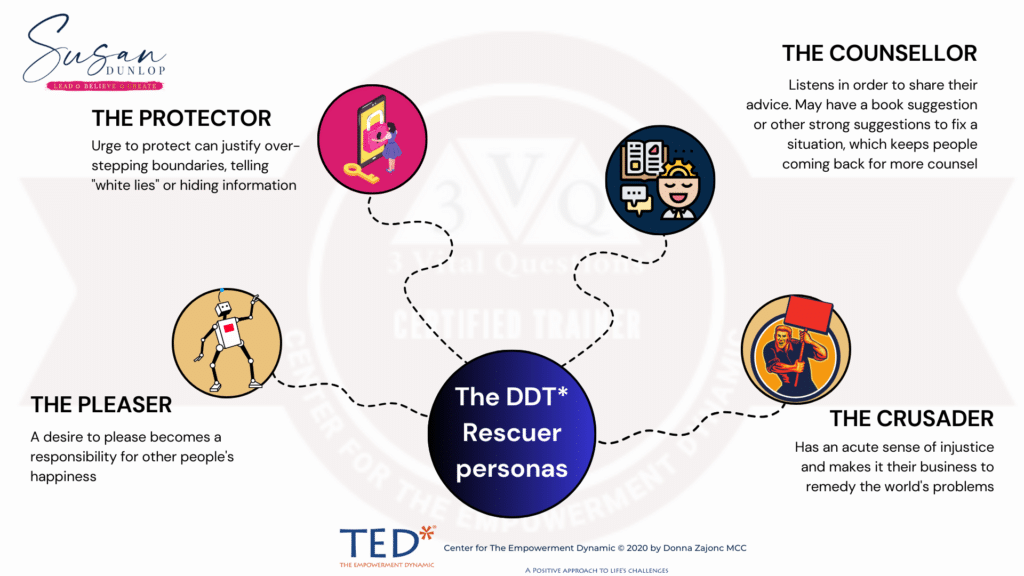This final blog of the five-part series will look at the DDT® or Dreaded Drama Triangle® Role Personas and how to liberate ourselves from the reactive state of the Victim, Persecutor and Rescuer Roles!
If you haven’t read the earlier posts in this series, I have shared links to the four of those at the bottom of this post.
We shift from the default DDT® roles by consciously choosing to be the Creator, Coach and Challenger!
Living the principles of TED*® takes conscious practice and it takes curiosity! Seeing and reading the descriptions of the DDT® personas is a favourite topic in the facilitated programs I deliver!
People love to see these and we have powerful discussions about how these DDT® Personas come about.
However, I acknowledge it also can feel dicey, and sometimes there is an uncomfortable silence as we each read through the persona titles and their descriptions, worried about what we’ll find out about how we’ve operated until now.
This is a lesson in self-acceptance, acknowledgement and non-judgement because we default to these roles for reasons (as discussed in earlier blogs). When we see them, we get to name and own them. Then we can make the choice whether or not we will change from reactivity to responsiveness.
Recap [note if you don’t want to recap, scroll to the heading ‘The active Victim mentality’]:
The Drama Triangle is a model of roles we human beings default to in times of stress. It was a model developed by Dr Stephen Karpman in the 1960s. In the work I deliver it has been re-termed the Dreaded Drama Triangle® (DDT®), with the permission of Dr Karpman, by the Center for The Empowerment Dynamic’s founder, David Emerald. David liked the idea of it being DDT®, because of the toxic nature of these roles at play.
In 2018, I was introduced to the healthy, empowering antidote roles to the DDT®, that of The Empowerment Dynamic (TED*®), a model developed by David Emerald. David is the best selling author of The Power of TED*. In 2021 I became Australia’s first certified facilitator in David’s work and deliver training programs to organisational leaders, teams and individual coaching clients across Australasia and the Asia-Pacific.
The DDT® is a triangle of toxic roles we all default to.
The roles are closely related to our reactive state. As a survivor of childhood trauma, that’s where I first connected the dots. You’ll likely have heard of the fight, flight, freeze and appease (or fawn) reaction? All human beings will have experienced these, or have one particular one they can relate to. The DDT® roles of Victim, Persecutor and Rescuer can be tied back to those reactions, that most often originated for us in childhood.
The DDT® is not bad, it’s just what it is. The part that’s not good is if we stay stuck in these roles as our way of operating on a daily basis. That’s an unhealthy place to come from regarding our relationship with ourselves, with those we love and with whom we relate daily.
The active Victim mentality
At the core of the three DDT® roles (Victim, Persecutor and Rescuer), there is an active Victim mentality; you could also refer to it as a mindset or orientation. These are adaptive survival strategies the ego employs to manage life’s circumstances.
Let’s take a look at the DDT® role personas. Take your time and breathe. Read each persona’s title and their respective description. All of us have one or two default personas we go to. This is so interesting to understand about ourselves and about people we relate to:
The DDT® Victim personas

When we’re in the central Victim Role of the DDT®, our focus is on wanting the situation to be different than it is (creating expectations), and that causes perpetual suffering. This suffering is the heart of the Victim mentality and belief that we will never have what we want.
At the root of the Victim mentality is the desire to be happy and to live a fulfilled life. That is central to human nature. When challenges arise, our ego wants to minimise or manage the pain caused by not having life go as we wish.
Making the shift from Victim to Creator begins with:
- Noticing your attitude towards others when you label THEM as victims.
- What triggers you? How do you see them?
- Developing trust.
- All Victims look for rescuers.
- Ask yourself how this behaviour of yours impacts others.
The DDT® Persecutor personas are:

In this role, we feel safe and secure because we are competitive and want to win by any means. We feel powerful, accomplished, and successful and need certainty, efficiency, and control over confusion. The DDT® Persecutor role exerts control over others or situations to reduce chaos and the unknown. They live based on their belief system, which is made up of winners and losers, right and wrong, black and white.
The Persecutor in us represents the “Fighter” in the Fight-or-Flight Mechanism. Our identity and sense of self is on the line and we are compelled to fight for it.
Important! There is a point to the Persecutor Role we play!
The Persecutor ‘requires us to look at what we may not want to see or feel.’ – James Hillman, psychologist and author, Archetypal Psychology, 1983.
If we can look at the Persecutor – whether a person, condition or circumstances – as something or someone that has come into our lives to challenge us to grow and develop, then the Persecutor becomes a catalyst for change and good!
Next is the DDT® Rescuer Role: How Do I Relieve Your Pain?
The Rescuer may unknowingly shield others from consequences of their actions. They fear not being needed and their focus is on others and their pain. The Rescuer wants validation by helping others. The language is that of fixing and saving: “I’ll take care of it…”. “Let me help you…”. “I’ll just do it myself…”.
In the Rescuer role we make two assumptions:
- Everyone else’s needs are a priority over mine.
- If I don’t do it, it won’t get done!
The DDT® Rescuer personas are:

The Recovering Rescuer:
- What is your relationship to silence? Rescuers have a difficult time holding silence.
- Adopt Ask First: Tell Second as a personal mantra.
- Slow down and PAUSE – know the world will go on, even if you are not saving it.
Interesting thought: Most people will identify as a rescuer, partly because this is the most ‘socially acceptable’ and reinforced role of the DDT®.
Conclusion
It is owning your ability to respond – your responsibility – that is fundamental to cultivating the path from DDT® to TED*®. To do that we must tell the truth about our current reality. When we are liberated from our reactivity, our creativity and innovation will spontaneously expand.
- Please give yourself time to reflect on the personas. Have a read over each again, and look at all those personas we choose from when we’re in the DDT® roles.
- Observe yourself and others in the week to come – which personas do you recognise and own?
- Reflect on this and the earlier Blogs on the topic (links are below).
Please contact me if you’d like to embark on a journey of discovery that will change your life.
Recommendation
If you haven’t already, get yourself a copy of The Power of TED* by David Emerald, available on Amazon. That is the foundational book. From there, you may wish to access the self-directed eCourse. As a certified facilitator in the work, I arrange that for you at a discounted price.
If you’d like to learn more about the programs available in this work, please message me via this link: Get In Touch
Take care,
Susan Dunlop
Until next week’s blog post, feel welcome to explore my previous posts for a more comprehensive understanding of the DDT® and TED*®:
The persona bubbles and the descriptions are an extract From Drama to Dreams Coaching Program, the copyright property of Master Coach Donna Zajonc, co-founder of The Center for The Empowerment Dynamic. I share this content with my blog community, and in trainings, as a certified facilitator in the Center’s work.
I share all TED* and 3VQ content here under licence, with permission of The Center for The Empowerment Dynamic © 2021. All rights are reserved.

